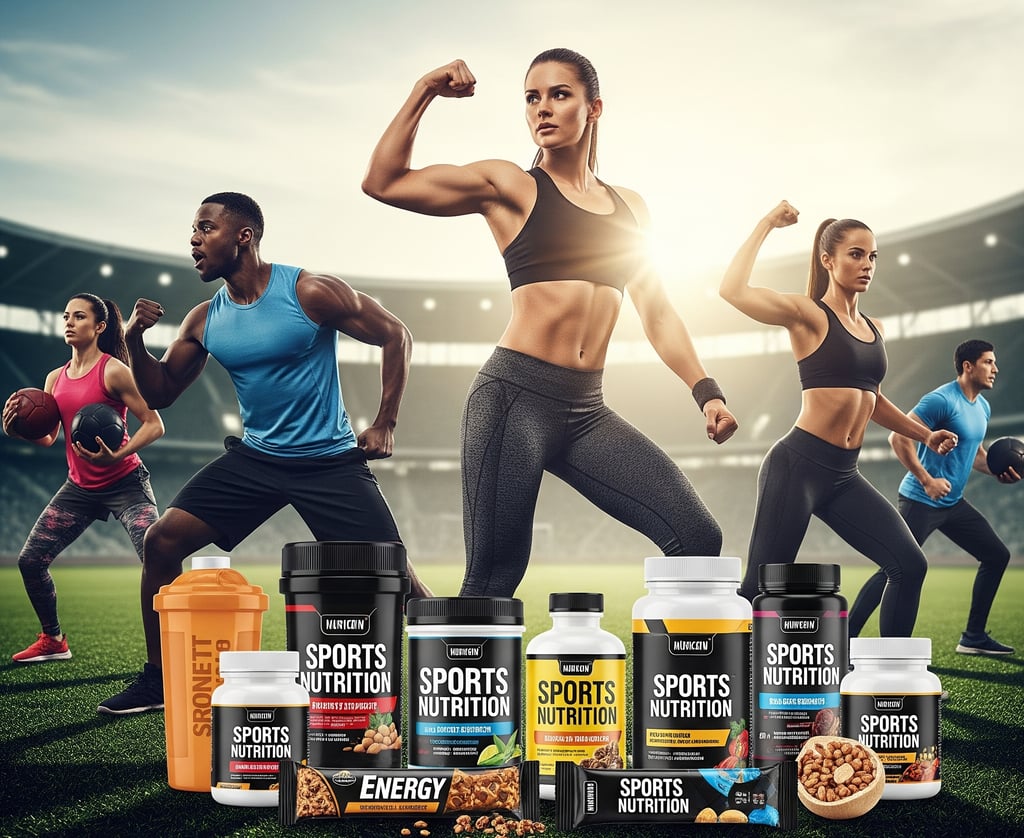Top 8 Questions About Sports Nutrition Answered
Get clear answers to the top 8 sports nutrition questions and learn how to boost your performance, recovery, and well-being.
HEALTHY EATING
6/22/20252 min read


Introduction: Unlock Your Potential Through Nutrition
Have you ever felt stuck despite training hard without seeing results? The answer could be in what you’re eating. Many athletes only turn things around once they adjust their nutrition. The difference between stagnation and improvement lies in the right fuel.
In this guide, we answer the 8 most searched questions about sports nutrition, backed by science and practical enough to implement today. Get ready to enhance your performance, speed up recovery, and protect your body.
1. How Many Calories and Macros Should I Consume?
For light training (1 hour/day): 3–5 g of carbs per kg of body weight
Moderate to intense (2–3 hours/day): 5–8 g/kg
High-volume training: up to 10–12 g/kg per day
Protein: 1.5–2.2 g/kg, with 20–40 g every 2–3 hours
Fats: the remaining calories, from healthy sources.
🧠 Curiosity Trigger: Did you know top athletes may need up to 12 g of carbs per kg body weight?
2. Should I Eat Before and After Working Out?
Before: 1–4 hours prior—1–4 g/kg carbs, 0.15–0.25 g/kg protein, low fat/fiber. Example: oatmeal with banana and yogurt
During: For workouts longer than 45 minutes, consume 30–60 g of carbs per hour via gels or sports drinks
After: Within 30–60 minutes consume 1–1.2 g/kg carbs + 0.2–0.4 g/kg protein (ratio 3–4:1) for optimal recovery
3. Protein Powder: Friend or Foe?
Protein powders (whey, casein, plant-based) are convenient for hitting daily goals but can’t replace whole foods that provide satiety and micronutrients
Ideal dosage: ~25 g after training, combined with carbs for optimal protein synthesis
Use responsibly and choose products certified by third-party testing
4. What Supplements Actually Work?
Creatine: proven to boost strength, power, recovery, and cognitive function
BCAAs: support protein synthesis and reduce muscle soreness; more effective with omega‑3
Omega‑3s: anti-inflammatory benefits; may help with muscle recovery
Beta-alanine, caffeine, vitamin D: strong evidence supports improvements in performance, endurance, and bone health
👉 Authority trigger: These recommendations align with positions from ISSN and IOC
5. How Can I Stay Properly Hydrated for Training?
Thirst isn’t a reliable indicator—clear urine is better. During workouts over 1 hour or with heavy sweating, replacing 250–400 mg of sodium per hour with sports drinks is recommended
Elite athletes weigh themselves before and after workouts to calculate fluid needs. Social proof trigger: if the best athletes do it, so should you
6. Is Fasted Training Worth It?
Training fasted may improve fat adaptation, but for long or intense sessions it increases the risk of fatigue or dizziness. If you choose to train on an empty stomach, at least have a fruit or small shake beforehand
7. How Do I Prevent Energy Crash During Workouts?
This typically signals depleted glycogen stores. Effective strategy: continuous intake of ~60 g carbs per hour (carb + protein mix) during extended sessions
8. Why Consult a Sports Nutritionist?
Individual factors—weight, age, gender, training intensity, injury history, dietary restrictions—vary greatly. A specialist can design a personalized, safe, and effective plan to maximize your gains
Conclusion: Nutrition Is Performance
Your training is only half the equation. The right nutrition supports, rebuilds, and fortifies your body. Small nutritional tweaks—like adjusting carb intake or adding creatine—can yield exponential improvements in performance, recovery, and health.
Internal Links
© 2025 PulseFit. All rights reserved.
“Small steps today, big results tomorrow.”
Stay inspired. Stay active. Stay healthy with PulseFit.


